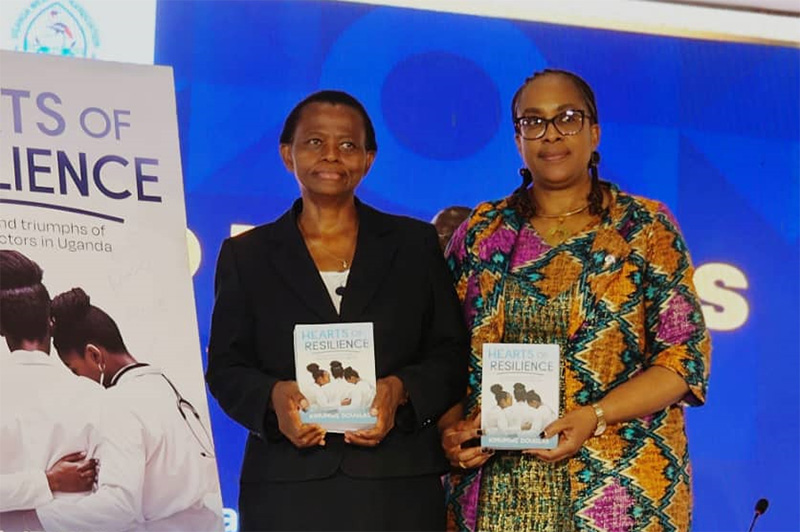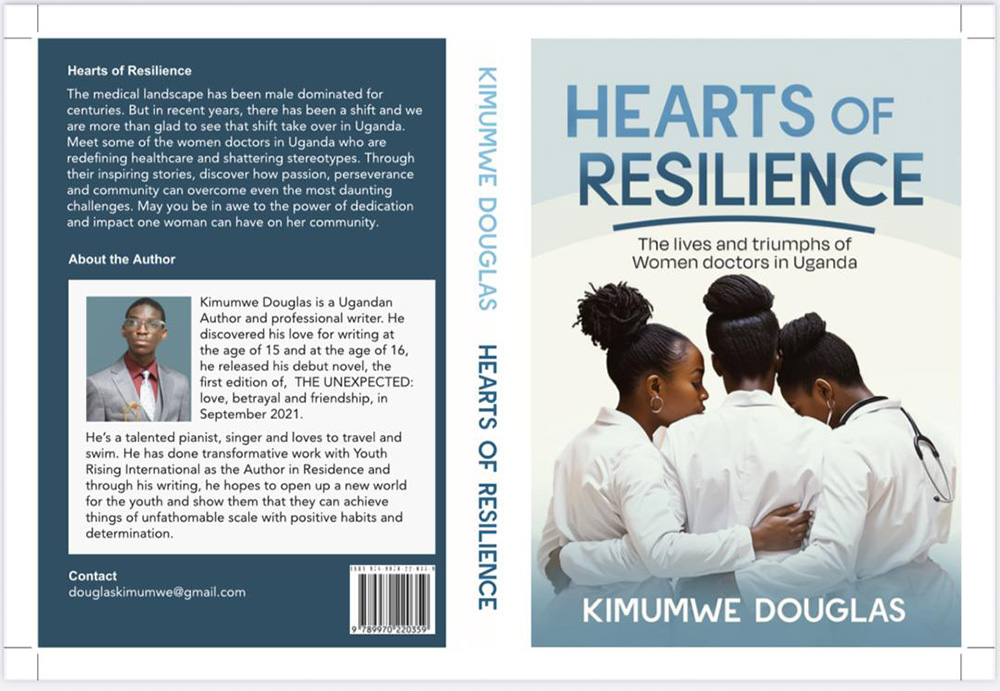Ugandan doctors urged to uphold integrity, compassion, and service
Speaking at the 9th Uganda Medical Association (UMA) Grand Doctors’ Conference and Annual General Meeting 2025, Nakyobe highlighted both the achievements and challenges of the medical fraternity, urging doctors to see medicine as a calling to serve humanity rather than a path to wealth.
The Head of Public Service, Lucy Nakyobe Mbonye, has lauded Uganda’s medical professionals for their dedication and resilience in their work. (File photo)
_____________________
The Head of Public Service, Lucy Nakyobe Mbonye, has lauded Uganda’s medical professionals for their dedication and resilience, calling on them to embrace integrity, compassion, and professionalism in their work.
Speaking at the 9th Uganda Medical Association (UMA) Grand Doctors’ Conference and Annual General Meeting 2025 in Mbarara, on Friday, November 7, 2025, where she represented President Yoweri Museveni, Nakyobe highlighted both the achievements and challenges of the medical fraternity, urging doctors to see medicine as a calling to serve humanity rather than a path to wealth.
Convened under the theme “Transforming Uganda’s Healthcare System for a Healthier Nation,” the two-day conference brought together doctors, researchers, policymakers, and health advocates from across Uganda and beyond to reflect on the challenges, innovations, and reforms shaping the country’s health sector.
A call to serve with compassion and integrity
In her keynote address, Nakyobe expressed deep admiration for the medical fraternity, sharing a personal connection through her late husband, Dr Mbonye.
“First and foremost, I love doctors, and that’s why I’m here. My late husband was one of you, and I will continue to support you wherever I can,” she said.
She commended doctors for their sacrifices during the COVID-19, Ebola, and Mpox outbreaks, describing them as “heroes who stood firm when others fled.” However, she also challenged the profession to confront unethical conduct that undermines public trust.
“We hear of informal payments, absenteeism, and poor treatment of patients. These practices damage your image and cost lives. You know those tarnishing your profession, why not clean your own house?” she asked.
Nakyobe urged young doctors to embrace medicine as a calling rather than a business and to carry out their duties with empathy and accountability.
“If you came into this field to get rich, you are in the wrong address. Being a doctor is a calling to serve humanity,” she stressed.
Government’s commitment to improving the health sector
Nakyobe outlined government efforts to strengthen the health sector, citing the 2022 salary enhancements for doctors and health workers, the expansion of positions, and the rehabilitation of health facilities across the country.
“We are seeing the benefits. People are more committed, and specialists who had left are returning. This is one way government is saying thank you,” she said.
She confirmed that government had resolved the long-standing issue of medical officer special grades, now reclassified as associate consultants, and that remuneration for those positions would soon be reviewed.
Beyond salaries, she emphasised the need for adequate medical supplies, modern diagnostic equipment, and continuous professional development, adding that “a functional health system must combine infrastructure, training, and ethical leadership.”
She revealed that the health sector was among the key areas prioritised for wage enhancement in upcoming budget discussions.
Nakyobe further called for professional accountability, urging doctors to shun absenteeism and unethical practices.
“If you came to this profession to get rich, you’re in the wrong place. Being a doctor is a calling, not a business. Serve your patients with empathy and honesty,” she said, adding, “We want you not just as clinicians, but as innovators, researchers, and reformers.”
She encouraged senior doctors nearing retirement to mentor the young instead of lobbying for contract extensions.
“When you are old, go home and let the young ones rise. They come with fresh ideas,” she said pointedly.
Global Medical Leaders Join Uganda in Health Dialogue
The conference was also graced by Dr Jacqueline Kitulu, President of the World Medical Association (WMA) and former President of the Kenya Medical Association (2016–2020). She reflected on her journey, inspired by Uganda’s Dr Margaret Mungherera, former WMA President.
Dr Kitulu, with over 25 years of leadership experience in healthcare governance and corporate management, underscored the importance of collaboration and professional solidarity across borders.
“Our challenges may differ in scale, but our mission is shared to build health systems that serve every citizen with dignity,” she said. “As an East African and as a woman with Ugandan roots, it gives me joy to see such unity of purpose here in Mbarara.”
Her keynote framed the global medical landscape as one of both crisis and opportunity, a time when physicians face pandemics, misinformation, and political pressures that test clinical independence. Against this backdrop, she called for a return to the moral core of medicine.
“The world looks to us not only as healers of disease,” she said, “but as voices of conscience and custodians of human dignity. The answer lies in empowerment rooted in ethics, sustained by leadership, and guided by our shared professional values.”
She emphasised that empowerment in medicine goes beyond access to resources, noting that true empowerment is “the ability of every healthcare worker to act according to conscience, guided by ethical principles and supported by systems that value professional judgment.”
She challenged associations to create environments where doctors can speak truth to power without fear, where young professionals are mentored rather than exploited, and where health policy is informed by evidence, not politics.
She also emphasised ethics at the conference: “Ethics remains the soul of medicine, and without it, science becomes sterile and technology becomes dangerous. Medicine without ethics is medicine without humanity.”
She encouraged Ugandan doctors to engage more with international medical bodies, use technology to improve patient outcomes, and champion gender equity in leadership.
Also present was Dr Simon Kigondu, President of the Kenya Medical Association (KMA), who hailed UMA as one of the most vibrant professional associations in Africa.
“UMA has always been my favourite conference since 2001 when I was first hosted by the late Dr Margaret Mungherera. Her mentorship inspired many of us to serve,” he said.
Dr Kigondu, also Secretary of the Coalition of African National Medical Associations, praised UMA’s influence on continental platforms.
“Through UMA’s leadership, Africa regained its rightful voice at the World Medical Association. Leaders like Dr Luswata have represented Uganda with eloquence and integrity,” he said, urging continued cooperation between national associations.
The complex realities facing Uganda’s health workers
While Nakyobe’s remarks were warmly received, several speakers highlighted the complex realities facing Uganda’s health workers.
Dr Wilberforce Kabweru, Chair of the Ethics and Professionalism Committee at UMA, provided context for why some young doctors are perceived as discontented or prone to strikes.
“It’s not that young doctors are bad or rebellious. The environment they work in is simply difficult. Many of them sleep in hostels or slums and cross trenches to get to work,” he said.
Dr Kabweru appealed to government to review training policy under the Uganda Medical and Dental Practitioners Council to ensure interns, Senior House Officers (SHOs), and fellows who simultaneously provide service, teach, and conduct research receive structured allowances and housing support.
“An intern who is dying cannot give life to a dignitary who is well catered for,” he remarked, drawing applause. “If their allowance could be raised from one million to two and a half, and if housing could be provided, it would make a huge difference.”
He thanked the government for recent progress but urged continued dialogue.
“When we come, please let six doors open, not one. We come in peace, and we come with love for our country,” he said.
UMA president hails progress on intern deployment
Dr. Herbert Luswata, President of UMA, praised the government for resolving the crisis of unpaid medical interns.
“A year ago, interns were on the streets. There were even suggestions that they should work for free,” he said. “But through consultations with the Head of Public Service and the Ministry of Health, we found solutions. Today, every intern in Uganda is deployed and paid. That’s progress worth acknowledging.”
Dr Luswata emphasiSed the need to build on that progress by expanding internship sites through public-private partnerships (PPPs) and encouraging private facilities to participate in training and mentorship.
The day we stop mentoring is the day we qualify for the grave
Professor Joseph NgonSi, Dean of the Faculty of Medicine at Mbarara University of Science and Technology, spoke passionately on the role of mentorship in elevating medical careers.
“No one here came fully accomplished,” he said. “We have all ridden on the shoulders of those who came before us, and we owe it to others to offer them the same lift.”
He emphasised that mentorship is not optional but existential for the medical profession.
“The day we stop mentoring,” he warned, “is the day we qualify for the grave.”
Prof. Ngonsi urged senior doctors to “empty themselves” of knowledge and skills for the benefit of those following behind, reminding them that mentorship ensures continuity of excellence and public trust.
“If I do not transfer the skills of performing a hysterectomy to my mentees with the highest proficiency, I am being selfish to the population they will one day serve,” he said.
He added that mentorship benefits both mentor and mentee, describing it as bi-directional growth that sharpens skills, renews perspective, and solidifies legacy.
“A life not given out is a life not lived positively,” he reflected. “Whenever you have the opportunity, transfer the best of your skills, that is how you contribute to the welfare of the world.”
Professional voices echo Nakyobe’s message
Prominent academic and public health specialist Prof. Edward Kanyesigye praised Nakyobe’s address for balancing empathy and accountability.
“She didn’t come to lambast us; she used appreciative inquiry. She praised where we are doing well, then gently added pepper where we are failing,” he said to laughter.
Prof. Kanyesigye urged doctors to embody what he called the “three Cs”: competence, commitment, and compassion.
“If every doctor graduates with those three, Uganda’s patients will never lack good care,” he said.
A conference of purpose and reflection
Conference chair Dr Asiphas Owaraganise said the 9th Grand Doctors’ Conference was not just a meeting but a movement to rethink Uganda’s health system.
“Our shared purpose is to transform healthcare delivery for a healthier nation. This gathering brings together practitioners, policymakers, and innovators to design solutions that work for our people,” he said.
He emphasised the need to implement the new public health service structure, embrace data and artificial intelligence, and strengthen physician-led health service delivery as the foundation for universal health coverage.
Celebrating resilient women doctors
In a fitting celebration, Nakyobe, together with WMA President Dr Jacqueline Kitulu, launched a book titled Hearts of Resilience: The Lives and Triumphs of Women Doctors in Uganda, compiled by Douglas Kimumwe.

The book chronicles the personal and professional journeys of Ugandan women doctors who overcame adversity to succeed in medicine, serving as role models for future generations.
Dr Catherine Odenyo Ndekera, Past Vice President of the Association of Uganda Women Medical Doctors, said the book was a testament to courage and perseverance.
“These stories remind us that resilience is at the heart of medicine. They show that with determination, humility, and faith, any woman can rise to serve,” she said.
Nakyobe urged doctors to carry forward the spirit of compassion and renewal.
“Let this gathering not only review where we are but shape where we are going. Let it reaffirm your identity as healers, inspire renewed purpose, and reignite compassion and empathy,” she said.